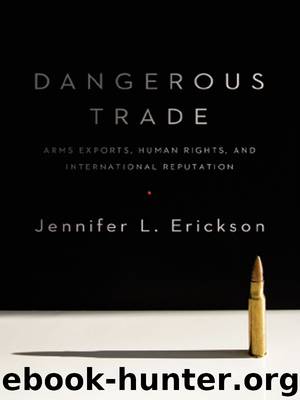Dangerous Trade by Jennifer Erickson

Author:Jennifer Erickson
Language: eng
Format: epub
Tags: POL001000, Political Science/International Relations/Arms Control, POL035010, Political Science/Political Freedom & Security/Human Rights
Publisher: Columbia University Press
Published: 2015-05-04T16:00:00+00:00
CONSEQUENCES FOR ARMS EXPORT DECISION MAKING
The Rwanda Affair did not have any direct consequences for French arms trade practices, nor did it inspire legislative reform. Significantly, it did spark civil society organization on the arms trade.57 However, NGOs remained weak until 2006, stopping policy makers short of developing a heightened sense of scandal sensitivity and leaving media a passive actor. Although a new discourse of “responsibility” arrived in French politics as a result of events in the 1990s (Roussel 2002), it remains to be seen how fully it will translate to arms exports. The nascent NGO community born of the Rwanda Affair has become more professionalized since the 2006 ATT process, opening up new avenues for accountability to regional and international norms and agreements. Greater transparency, too, has come about due to international commitments.
Minor scandals since 2000 have so far lacked the teeth to encourage serious reform. “Angolagate”—in which government officials were charged with trafficking Soviet-made weapons to Angola during the 1990s—resulted in the arrest of Mitterrand’s son and former Africa adviser Jean-Christophe Mitterrand in 2000 (Gee 2000; Henley 2001). In 2004, he was found guilty, fined, and given a suspended jail sentence. In 2009, Interior Minister Charles Pasqua was also convicted of corruption charges, responding with, as one report put it, a call “for an end to the official secrecy act on documents concerning arms sales” (Hollinger 2009). The arrests and initial trials appeared to mark a change in French responses to arms trade scandal and a somewhat more aggressive media with a lower public toleration for corruption (Bell 2001; interview 60108220). However, an appeals court acquitted Pasqua on all charges in 2011 and cleared other defendants of arms-trafficking charges, leaving the impression that perhaps the French justice system was not so concerned with arms sales after all (Thréard 2011).
Although one official claims that “in a democracy, regardless of whether there are strong NGOs, everyone is afraid of what can be said” (interview 59108220), France’s reputational concerns began to appear only with the professionalization of the NGO community since 2006. Officials now express image concerns connected to France’s arms trade and increasingly fear the negative public attention arms trade scandals generate (interview 59108220). Arms export decision makers are careful to keep detailed records, showing exactly what has been transferred and that each transfer is within the law: “You have to leave things crystal clear for years down the road when they could be questioned” (interview 59108220). Officials also take care to note what they see as the highly restrictive nature of French arms export law. They add that France has largely ceased to export small arms to Africa because of the political risk (interviews 59108220, 60108220). These developments suggest a growing sense of responsibility and an interest in relatively more restrictive sales in response to reputational concerns.
In addition, the government has begun to engage with NGOs, noting that the NGO culture has transformed radically in recent years (interviews 59108220, 60108220). Indeed, the government’s receptiveness to parliamentary, public, and civil society input “is brand new, and not just an issue for weapons” (interview 64208220).
Download
This site does not store any files on its server. We only index and link to content provided by other sites. Please contact the content providers to delete copyright contents if any and email us, we'll remove relevant links or contents immediately.
| Anthropology | Archaeology |
| Philosophy | Politics & Government |
| Social Sciences | Sociology |
| Women's Studies |
The Secret History by Donna Tartt(19092)
The Social Justice Warrior Handbook by Lisa De Pasquale(12190)
Thirteen Reasons Why by Jay Asher(8912)
This Is How You Lose Her by Junot Diaz(6887)
Weapons of Math Destruction by Cathy O'Neil(6281)
Zero to One by Peter Thiel(5802)
Beartown by Fredrik Backman(5755)
The Myth of the Strong Leader by Archie Brown(5508)
The Fire Next Time by James Baldwin(5447)
How Democracies Die by Steven Levitsky & Daniel Ziblatt(5219)
Promise Me, Dad by Joe Biden(5154)
Stone's Rules by Roger Stone(5088)
A Higher Loyalty: Truth, Lies, and Leadership by James Comey(4964)
100 Deadly Skills by Clint Emerson(4926)
Rise and Kill First by Ronen Bergman(4789)
Secrecy World by Jake Bernstein(4753)
The David Icke Guide to the Global Conspiracy (and how to end it) by David Icke(4720)
The Farm by Tom Rob Smith(4514)
The Doomsday Machine by Daniel Ellsberg(4490)
